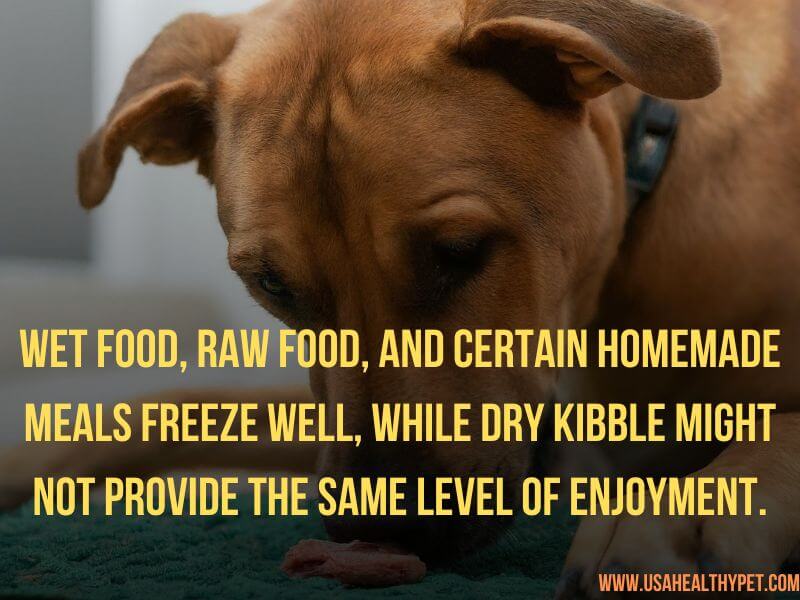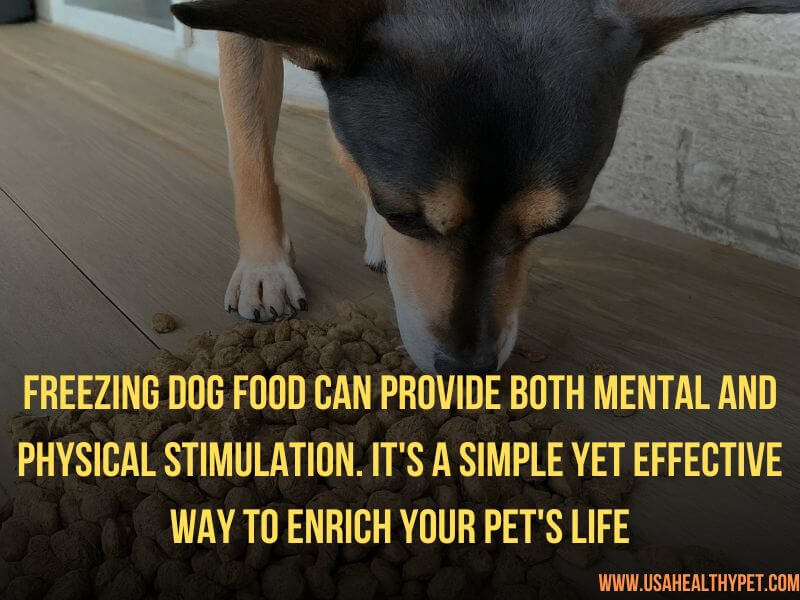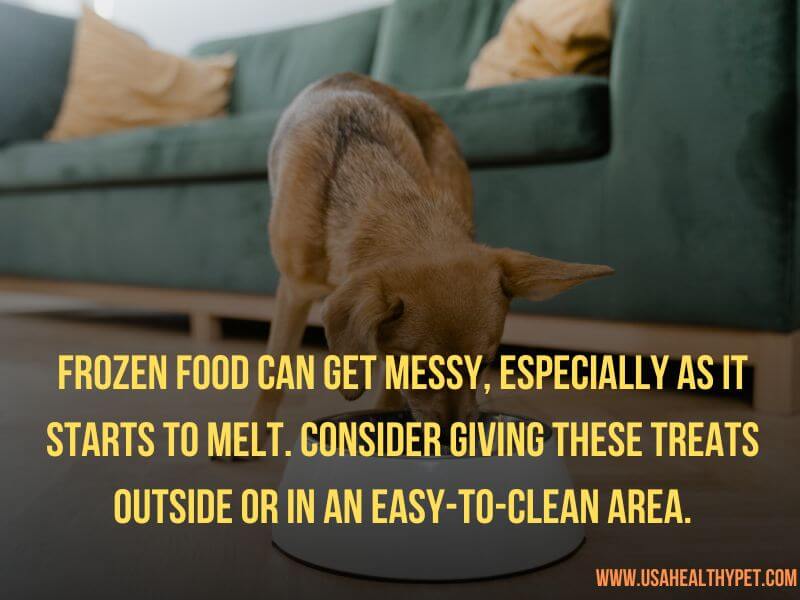Freezing dog food for enrichment is a fun and beneficial way to add excitement to your dog’s life.
If you’re a dog owner looking for ways to keep your furry friend entertained and mentally stimulated, this article is for you.
Why Freeze Dog Food for Enrichment?
You might wonder, “Why should I freeze dog food for enrichment?” Like us, dogs can get bored with their everyday routines.
By freezing their food, you’re not only changing up the texture and temperature, but you’re also providing a challenge that can keep them occupied for longer periods. Plus, it’s a great way to beat the heat in the summer!
The Benefits of Freezing Dog Food
Freezing dog food isn’t just about keeping your pup busy. It also contributes to their overall well-being. Let’s take a look at some of these advantages:
- Mental Stimulation: Dogs are naturally curious and love to explore. Freezing their food turns mealtime into a fun puzzle that they need to solve. Dr. Karen Becker, a well-known veterinarian, says, “Freezing dog food can provide both mental and physical stimulation. It’s a simple yet effective way to enrich your pet’s life.”
- Slower Eating: If your dog tends to gobble down their food too quickly, freezing it can slow them down, which is better for digestion. Dr. Sophia Yin, a veterinarian and animal behaviorist, mentions, “Using frozen food as a puzzle can help reduce anxiety and destructive behaviors in dogs. It keeps them engaged and satisfied.”
- Cooling Treat: On hot days, a frozen meal can help your dog cool down, much like a popsicle does for us.
- Variety: Adding variety to your dog’s diet can make mealtime more exciting and enjoyable.

Research from the Journal of Veterinary Behavior suggests that dogs provided with food puzzles, including frozen food, show fewer signs of boredom and anxiety. The study highlights that engaging dogs in such activities can improve their overall behavior and well-being.
How to Freeze Dog Food for Enrichment
So, how do you go about freezing dog food? It’s simpler than you might think!
Choosing the Right Food
First things first, make sure you’re freezing the right kind of food. Not all dog food is suitable for freezing.
Wet food, raw food, and certain homemade meals freeze well, while dry kibble might not provide the same level of enjoyment.
Tools You’ll Need
You don’t need anything fancy to get started. Here are a few basic tools that can help:
- Ice cube trays: Perfect for portioning out smaller treats.
- Kong toys or other stuffable toys: These are fantastic for stuffing with food and freezing.
- Muffin tins: Great for creating larger frozen treats.
Step-by-Step Guide
- Prepare the Food: Depending on what type of food you’re using, you might need to blend or mash it to make it easier to freeze.
- Portion It Out Use ice cube trays, Kong toys, or muffin tins to portion the food.
- Freeze: Place the filled trays or toys in the freezer and let them sit until fully frozen.
- Serve: Once frozen, give the treat to your dog and watch them enjoy!
Practical Tips for Freezing Dog Food
Ready to give it a try? Here are some practical tips to help you get started.
- Start Small: If your dog has never tried frozen food before, start with small portions to see how they react.
- Mix It Up: Combine different food types or add some dog-friendly fruits and vegetables for variety.
- Stay Safe: Always make sure the food you’re freezing is safe for dogs to consume.
Quick and Easy Recipes
Here are a few simple recipes you can try:
- Peanut Butter and Banana: Mix mashed banana with a spoonful of peanut butter and freeze in an ice cube tray.
- Chicken Broth Cubes: Pour low-sodium chicken broth into an ice cube tray and freeze.
- Yogurt and Berry Delight: Blend plain yogurt with blueberries and freeze in muffin tins.

Comparing Different Options
Let’s compare a few different methods of freezing dog food for enrichment. Here’s a handy table to summarize the key points.
| Method | Pros | Cons |
|---|---|---|
| Ice Cube Trays | Easy to portion, quick to freeze | Can be messy, and more prep time |
| Kong Toys | Engaging, reusable | Takes longer to freeze, and bulky |
| Muffin Tins | Larger portions, variety | Takes longer to freeze, bulky |
Additional Considerations
While freezing dog food is a fantastic enrichment activity, there are a few additional considerations to keep in mind.
Dietary Restrictions
If your dog has any dietary restrictions or allergies, make sure the ingredients you’re using are safe for them. Always consult with your vet if you’re unsure.
Monitoring
Always supervise your dog the first few times they try frozen food to ensure they don’t have any adverse reactions or difficulties.
Clean Up
Frozen food can get messy, especially as it starts to melt. Consider giving these treats outside or in an easy-to-clean area.
Advanced Tips
Once you’ve got the basics down, here are some advanced tips to take your dog’s frozen food experience to the next level.
- Layering: Create layers of different foods in Kong toys or muffin tins to make the treat more interesting.
- Hiding Treats: Hide small treats within the frozen food for an extra surprise.
- Interactive Toys: Use interactive toys designed for freezing to provide additional challenges.

Conclusion
Freezing dog food for enrichment is a simple yet effective way to keep your dog entertained and mentally stimulated.
Whether you’re using ice cube trays, Kong toys, or muffin tins, there are endless possibilities to explore. Remember to start small, mix things up, and always consider your dog’s dietary needs. Happy freezing!
FAQs
1. Can I freeze any type of dog food?
Not all dog foods are suitable for freezing. Wet food, raw food, and certain homemade meals work best.
2. How long should I freeze the dog food?
Typically, it takes a few hours to freeze, but overnight is often best to ensure it’s fully solid.
3. Are there any safety concerns with freezing dog food?
Always use dog-safe ingredients and supervise your dog the first few times they try frozen food to ensure they don’t have any adverse reactions.
4. Can I add supplements or medications to frozen food?
Consult with your vet before adding any supplements or medications to ensure they remain effective and safe when frozen.
5. How often should I give my dog frozen food treats?
It’s best to use frozen food treats as part of a balanced diet. Consult with your vet for recommendations based on your dog’s specific needs.

Pingback: Can Dogs Eat Raw Cauliflower? Benefits, and Risks